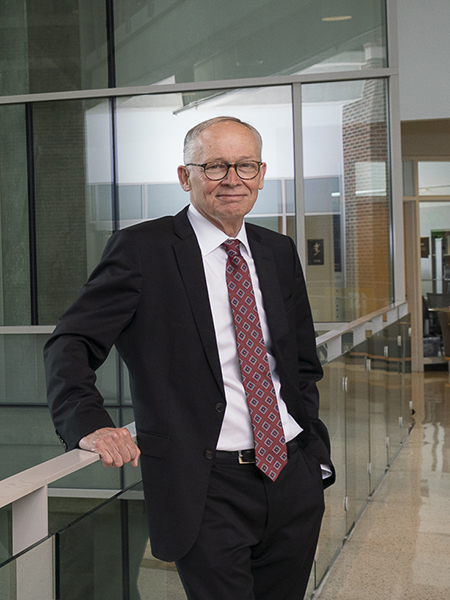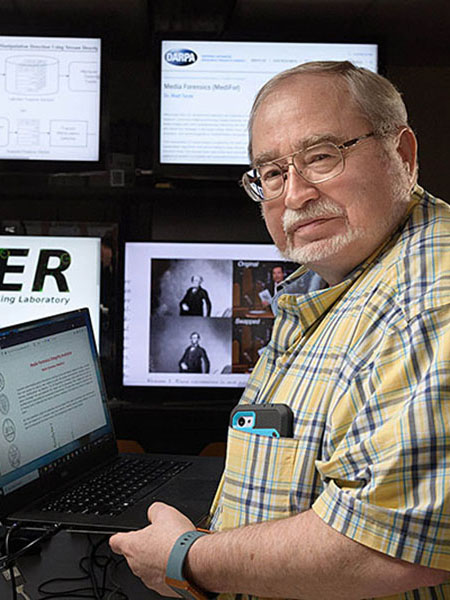ECE professors named fellows of Krach Institute for Tech Diplomacy at Purdue

The Krach Institute for Tech Diplomacy at Purdue has added two professors from the Elmore Family School of Electrical and Computer Engineering to its ranks, adding doctorate-level expertise in semiconductor devices and manipulated media to its best-in-class research and policy development at the nexus of technological innovation and the practice of diplomacy.
The nonpartisan Institute is welcoming Mark Lundstrom, Ph.D., whose research and teaching focuses on electronic and thermal transport in semiconductor devices; and Edward J. Delp, Ph.D., who will educate, as well as provide detection tools and migration methods, on the threat of manipulated media.
They join the Krach Institute’s growing ranks of fellows with expertise on emerging topics such as artificial intelligence, hypersonic technologies, quantum computing, advanced wireless systems and other technologies that have the potential to reorder relationships among nations.
Founded in July 2021 as the Center for Tech Diplomacy at Purdue, the program relaunched earlier this month as the Krach Institute for Tech Diplomacy at Purdue University.
The Institute is the world’s first and only institution focused on Tech Statecraft, a new model of transformational diplomacy that integrates high-tech strategies with foreign policy tools and national security practices to ensure trusted technology is used to advance freedom. The Krach Institute for Tech Diplomacy leverages Purdue University’s strength in innovation, deep expertise in technology, and global prowess in educating transformational leaders, combined with its members’ track record of building market-leading high-tech companies, onshoring strategic supply chains, and building global trust networks.

“Our fellows bring unmatched expertise and insights into the issues shaping not just the world today, but future generations as well,” said Krach Institute Director Bonnie Glick. “More importantly, they share our commitment to the bipartisan mission of advancing freedom through tech statecraft. With the addition of Mark and Edward, the Krach Institute continues to be an indispensable resource to policymakers as leaders must forge a new model of global statecraft for the challenges of our time.”
Mark Lundstrom is the Don and Carol Scifres Distinguished Professor of Electrical and Computer Engineering at Purdue University, where he also serves as principal advisor on microelectronics to the Executive Vice President for Strategic Initiatives. He also currently sits on the Executive Committee of the American Semiconductor Academy. During 2020, he served as acting Dean of Purdue’s College of Engineering, the largest graduate program in the United States to be ranked in the top 5 and the largest undergraduate program in the top 10.
“Technologies and societies evolve at dramatically different rates,” Lundstrom said. “Tech diplomacy, wise and thoughtful diplomacy informed by an understanding of fast-paced modern technologies, will be critical to building a world in which technology advances freedom.”
Edward J. Delp is the Charles William Harrison Distinguished Professor of Electrical and Computer Engineering and Professor of Biomedical Engineering at Purdue University. He is also Professor of Psychological Sciences (Courtesy) and Professor of Computer Science (Courtesy). His research interests include image and video processing, multimedia security, image analysis, computer vision, machine learning, image and video compression, medical imaging, multimedia systems, communication and information theory.
“Manipulated media, including Deep Fakes, may cause changes in our society in how we interact with each other,” Delp said. “What we believe is true may get a lot more complicated. My role is to educate people on the threat and provide tools to detect and migrate manipulated media.”
The Krach Institute for Tech Diplomacy at Purdue brings engineering expertise to the intersection of technology and U.S. foreign policy and serves as a go-to resource on critical technology issues for the diplomatic community and policymakers, while partnering with industry, academia, and government.
Souce:Krach Institute for Tech Diplomacy at Purdue Announces 3 New Fellows
